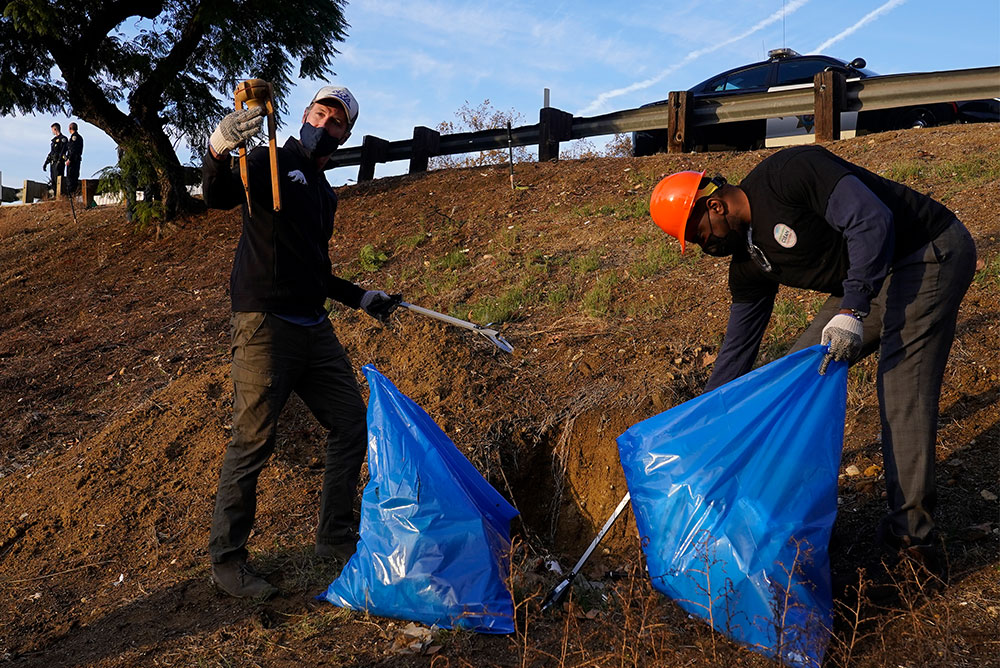
California Gov. Gavin Newsom, left, and Caltrans director Adetokunbo “Toks”Omishakin, right, pick up trash along the CA-110 freeway in Los Angeles. Courtesy of AP Images.
Is he our governor or our garbage man?
Gavin Newsom combines those roles so routinely that the picking up of trash has become a defining image of California’s chief executive. He’s lifted away litter in the Bay Area. He’s helped Caltrans crews grab garbage along the highway in Fresno. He’s gone to the same Southern California stretch of the 110 freeway twice, first to paint over graffiti and pick up abandoned mattresses, and later to dedicate a new mini-park. And most recently, he was back in L.A. to gather up the cardboard remains of packages stolen from trains.
The governor’s devotion to detritus is so determined that it’s caused head-scratching among political insiders and even his own aides, one of whom recently wondered in my presence why the boss spends so much time with trash.
Back when these public displays of cleanliness began during last year’s recall campaign, the pick-ups seemed to be a practical response to short-term policy and political needs. On policy, the governor was securing more than $1 billion from the legislature to clean up a California that had grown dirty and trashy during the pandemic. As a political matter, community cleanups seemed to bring down to earth a governor who, in dining at the French Laundry and depending on a preponderance of polysyllabic words in his public pronouncements, seemed to float above the rest of us.
But even with the recall vanquished, and re-election all but assured (despite the latest masking controversy), the governor keeps picking up trash. And that raises questions about the deeper emotional, cultural, and even spiritual meaning of a California governor who can’t stop pursuing cleanliness.
Is this some New Age political metaphysics? Has some strange compulsion afflicted the second most powerful elected official in the world’s most powerful country? Or is Gavin Newsom, a man of so many words that we’ve all lost count, saying something profound by constantly getting his hands dirty?
On these queries, your columnist sees the trash can as half full. In fact, I would go so far to say that, at the level of metaphor, Newsom has now surpassed all 39 of his gubernatorial predecessors in locating his job’s essence: picking up other people’s trash.
In too many ways, California’s governor is nothing so much as a garbage man, albeit one with the power to call up the National Guard. Californians have a lot of ideas, many of them bad, and for a century and a half, they’ve been transforming bad ideas into laws and ballot measures. All this legislative litter has turned the state’s governing system into a dump, with piles of unsorted garbage making the treasure—the new policies and practices worth pursuing—nearly impossible to find.
Governors, thus, don’t really govern the state freely. Instead, they spend their terms trying to pick up trash—rejecting budget proposals, vetoing bills, or saying no to proposals to add to the junk pile. And when governors make progress on their own agenda, they must start by tidying up all the legislative and constitutional messes made by previous voters, lawmakers, and courts, which stand in their way.
So, when our janitor-in-chief picks up trash on the side of the 99, he’s acting out in the real world what he must do back at the Capitol.
In this year’s budget, Newsom is trying to find his way around a 43-year-old piece of voter-approved trash known as the Gann spending limit, an outdated formula standing in the way of necessary spending. Tackling the emergency of homelessness involves the literal cleanup of encampments and a thorough scrubbing of the state’s junkyard of old and overlapping homeless programs.
And that’s not to mention the state’s own trash and recycling policies, which constitute a veritable landfill of highly contested fights over composting requirements and a ballot initiative to reduce single-use plastics coming up in November.
In this context, removing trash carries a symbolic power, as Newsom himself has noted during his public cleanup appearances. “It’s about restoring a sense of pride and sense of spirit, a sense of place, a sense…of community,” he said at one cleanup. “Because once people feel connected to something, once they feel ownership to something, they’re more apt to protect it, to preserve it, to cultivate, support and invest in it, and we just need more of that.”
Among Californians who feel more connected by cleaning up is the governor himself.
I recently asked Newsom, who is Catholic, whether there was a spiritual dimension to his garbage devotion. In watching his constant cleanups, I was reminded of Jesus’s criticism of the Pharisees, high religious officials who demand cleanliness and obedience from others, while remaining so distant from real people that they are blind to lived realities. “Thou blind Pharisee, cleanse first that which is within the cup and the platter, that the outside of them may be clean also,” Jesus advises in Matthew 23:26.
Replying by text, Newsom referred to his previous job as San Francisco mayor. Part of his devotion to cleaning up trash, the governor said, “has to do with living in a ‘moment’ where so much seems outside our control… the ‘cause/effect’ of getting out and cleaning up is deeply satisfying—particularly having served as Mayor where I could see results/failure in real time—unfiltered. So much of state government is disconnected from that feedback loop (or is filtered).”
He added: “The physical not just the mental is what I miss most—faith and works!”
Even in California, cleanliness is next to godliness.




Send A Letter To the Editors